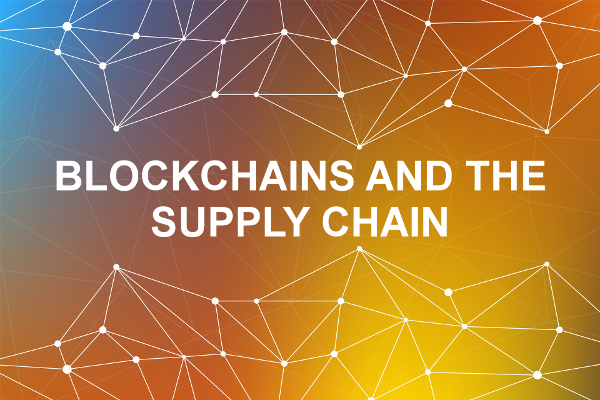It seems everyone in the logistics and supply chain world is talking about blockchains at the moment. There are articles and blog posts aplenty, and conferences discussing how they are applicable to the supply chain. But what are blockchains and should businesses consider moving their supply chains onto these revolutionary platforms?
What are blockchains?
Blockchains are distributed databases that can continually grow. Each set of data in the database is contained within a block, and each block has a timestamp and a link to the previous block. So the blocks are “chained” together in a linear, chronological manner.
A block contains a fixed record that all the other blocks have a copy of, so it’s impossible to retrospectively change the data within a block without altering all of the blocks that come later, and consequently alerting the entire chain to the intended modification. Hence, blockchain is seen as an incredibly secure way of storing data.
Blockchain is the technology platform that underlies Bitcoin and other cryptocurrencies. And in the same way that it facilitates financial transactions on the internet, blockchain can act as a distributed ledger of transactions between two parties. The transactions don’t have an owner, but they can be accessed by anyone with prior authorisation to the private network and they have a record, which is both permanent and verifiable.
The benefits of blockchains
With blockchains, businesses can do away with banks since the encrypted transactions do not require any third party input or authorisation. Democratising transactions in this way not only saves the inevitable costs of an intermediary, but it saves time too. Transactions can take place and payments can be verified and reconciled immediately.
The fundamental security benefit of blockchains is that they cannot be shut down in the same way that a server can be taken out. The architecture of a blockchain is decentralised and the data is widely distributed. There is no “single point of failure”, thus maintaining the integrity of the data and ensuring a permanent record of it is kept.
Fraud can be much reduced too. A permanent and secure audit trail is available to all parties within the network, which registers all transactions, product movements and payments.
Increased efficiencies can be made, thanks to the speeding up of the admin processes involved in an industry that is transaction-heavy when it comes to paperwork, signatures and document exchange. The time-consuming and labour-intensive processes that make up trade finance can be expedited and made more efficient.
How can blockchains be used in the supply chain?
Blockchains are widely being vaunted as the next big thing in supply chain. Because they are run using a “decentralised consensus”, they are self-governing, “democratic” even. This makes them resilient, flexible and transparent, all of which are extremely useful features for providing documentation in the supply chain.
Applications are varied, but one particular function is that they can be applied where you need a signature. So, for example, they can be used to record letters of credit in international trade, bills of lading and transport contracts.
Because they provide a fast, accurate way of tracking through the supply chain, blockchains can be used to track transactions, products and assets. So, not only can you have a record of transactions, the goods themselves can be tracked, as can the assets being used to transport them, such as fleet vehicles or shipping containers.
The ledger can also be programmed to trigger transactions, so bringing a level of automation to the supply chain and reducing the need for manual reconciliation or intervention.
Blockchains will inevitably disrupt – or even replace – the Electronic Data Interchange (EDI) market we know today. Currently, EDI relies on a standardised format for exchanging documents and a number of centralised value added network providers (VANs) to move these documents around. In a democratised blockchain, the documents will be stored and forwarded across a distributed network. Blockchain technology could negate the need for VANs and open the flood gates for a more seamless flow of information between companies and individuals.
Because of the replication of the data and the inability to alter it, accuracy comes built-in with blockchain technology. All manner of documentation – such as orders, receipt of goods notices, invoices and payments – benefit from the reduction in errors. And the increased accuracy avoids delays and speeds goods through the typical supply chain bottlenecks.
Will blockchains revolutionise supply chain?
Although the technology and principles behind blockchains are certainly revolutionary – and the benefits they bring much welcomed – it seems there is still some latency in adopting them. While Bitcoin seems to be becoming more widely accepted and adopted, it’s yet to be seen how widespread blockchain will become in the supply chain industry. Some of the big names have undertaken successful pilot projects, but the uptake is still not very extensive as yet.
Perhaps it’s just early days for what is a technology still in its infancy, but the speed of change in today’s world is far greater than ever before. So it’s interesting to note that the authors of an article in the Harvard Business Review have predicted that blockchain will produce “dynamic demand chains in place of rigid supply chains, resulting in more efficient resource use for all.” So, if blockchain comes of age, as many think it will, we may well be renaming this industry of ours “demand chain” soon enough.
Explore the benefits of blockchain technology for your supply chain by speaking to one of our supply chain consultants. Call us on 020 8819 9071 or contact us using the website form.
